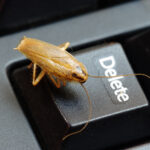By late summer, all the wasp eggs have hatched and the wasps have all left the nest. At this point, they are no longer looking for insects and nectar to eat but instead, will become more interested in your food and garbage. It is also during this time that wasps become the most aggressive as they try to survive.
Controlling Wasps
As wasps become aggressive, you may find it extremely difficult to get rid of them on your own, particularly if there is a nest hanging nearby. First and foremost, it is important to never swat at wasps or try to crush them. Doing this may only result in you getting stung anyway but worse, wasps release pheromones when they sting or are crushed, and it is this chemical that calls out to nearby wasps and causes them to swarm. Instead, it is better to remain calm and still and remove yourself from the situation, or try to deter the wasp.
When controlling wasps, many homeowners try DIY measures that include creating their own traps. These traps often include plastic bottles, funnels, and sugary liquids, but none of these are the best way to get rid of a wasp problem.
It is more important to trap wasps rather than kill them. When working on building their nest, wasps feed off of mainly insects and nectar, which is a very effective and natural pest control solution. However, the traps that homeowners create when trying to eliminate a wasp problem usually kill the wasps by drowning them, removing that pest control and perhaps leading to bigger problems.
Additionally, homemade traps simply do not usually work. Even when they do, they are usually more effective at eliminating yellowjackets, not hornets or other types of wasps, such as paper wasps. For this reason, it is always best to call a professional pest control company that can help keep wasps out of your home and yard.
It is important to regularly inspect the outside of the home and to look for cracks and crevices that could allow wasps into the home. While conducting these inspections, it is also important to look under the eves and roofs of buildings, as these are likely places for a wasp colony to create a nest. Wasps prefer to build their nests in areas that are dark and quiet. So, if there is a location around the home that is particularly problematic, installing a light may be enough to keep wasps away.
After finding a nest, there are steps you can take to remove it yourself, but this is particularly dangerous. An experienced and professional pest control service can take care of this dangerous job to keep you and your family safe.











